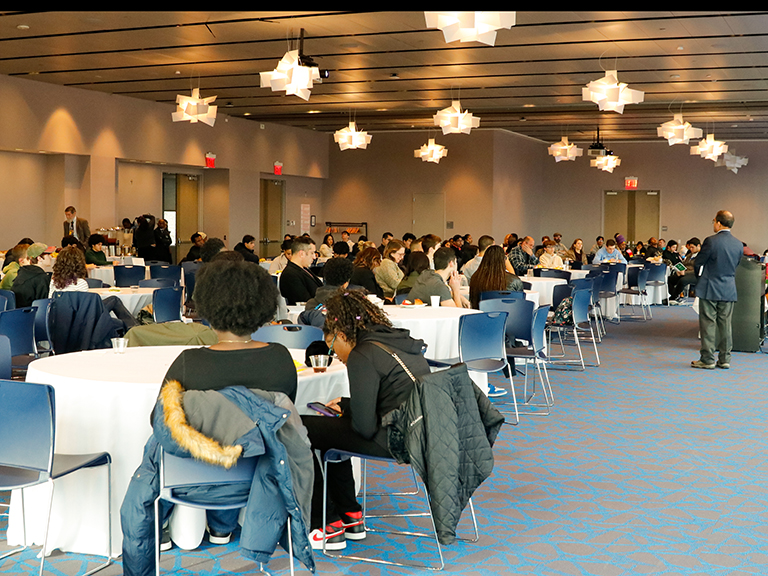Manhattan College Hosts ACE Mentor Day
The ACE Day event was attended by 129 guests, including 66 high school students.
Manhattan College hosted ACE Day for prospective students and their families on Saturday, December 2 giving them an opportunity to learn more about how the ACE Mentor program can help students in their pursuit of careers in engineering, construction and architecture. Attendees were able to hear first hand stories from students, faculty and alumni who have participated in and benefited from the program. 
The event featured a welcome video address from Manhattan College President Milo Riverso ’81, Ph.D., P.E., and Charles Thornton ’61, Ph.D., P.E., a founder of the ACE program. Thornton is a member of the National Academy of Engineering and a founding principal and former co-chairman of the international engineering firm Thornton Tomasetti. The event also included presentations on admissions and financial aid and tours of the campus and engineering laboratories.
The ACE Mentor Program is a national program that pairs high school students with industry professionals, who serve as mentors and teach the core principles of the ACE professions. Every year between November and May, teams of students work on extensive mock design projects. Graduating seniors are eligible for scholarships to pursue college education in the fields of architecture, construction or engineering.
More than $3 million is awarded in scholarships annually to students who participate in ACE nationwide. ACE of Greater New York includes more than 1,500 high school students and more than 700 professional mentors on 45 teams.
In a video message, Thornton told the audience that ACE was conceived of as a way to bring more underrepresented groups into those professions. He added that the program has become so successful that it is now made up of about 70% women and minorities. He said another measure of success was that most of the major engineering, architectural and contracting firms participate in ACE chapters throughout the country. Manhattan College has benefited from the program by attracting students into the School of Engineering and preparing them for the workforce.
The ACE Day event was attended by 129 guests, including 66 high school students. The students had the opportunity to learn about the admissions process at Manhattan College, the financial aid options available to them and about the many engineering majors offered by the College. The attendees also had the opportunity to meet with current students and Manhattan alumni. Walter Saukin, Ph.D., associate professor of civil and environmental engineering gave the closing remarks. Saukin has been involved with the ACE program from its start and has helped make it a successful nationwide program. 
“ACE has been a great program because it involved going into New York City schools and attracting kids into the study of architecture, construction and engineering,” said Riverso in the video message. “Manhattan College has always been committed to ACE, and we will continue to partner with ACE into the future.”
Riverso said that in the first 24 years of the ACE Mentor Program of Greater New York, the three chairs of the program were all Manhattan College alumni.
To celebrate the 30th anniversary of ACE, Manhattan College will offer special opportunities to high school seniors who are part of the ACE Mentor Program, including a $10,000 scholarship. ACE participants are eligible to receive an additional $10,000 scholarship during their four years enrolled at Manhattan College. This scholarship is offered in conjunction with merit-based awards, recognizing the students outstanding achievements and commitment to their education.
“The ACE Mentor Program is a great way for high school students to learn about engineering and construction,” said Anirban De, Ph.D., interim dean of the School of Engineering. “It gave us a chance to showcase our engineering programs and the success of our past and current students in front of high school students and their parents. The industry and more broadly our society, benefit in the long run by attracting bright young professionals to follow rewarding career paths that are critical for maintaining and renewing the nation’s infrastructure.”